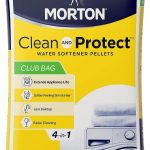In areas that have a high level of hard water concentration, it is always essential to opt for the right sort of water softener. But, has it ever come to your mind if it is safe to consume softened water? Can a water softener make you sick? Well, that may be dependent on several factors. Let us check out the finer details of whether it is safe to drink soft water.

If the water softener is well maintained, it can be quite safe for health. People may fall sick when using a water softener due to misuse or improper maintenance. The salt used in the water softeners is quite minimal and does not even come close to the water we use in our food. From that perspective, water softener does not make you sick.
Are Water Softeners Safe?
A water softener that has been well maintained and working properly does not typically cause any serious health concerns. If anyone has been found to fall sick due to the consumption of soft water, it should typically be due to the misuse and ill management, but not due to the water softener or the softening proess per se.
For most of the normal adults, the amount of salt contained in the water softener is quite low. It should not typically cause any health concerns. In fact, the amount of salt does not even change the way your water tastes. As long as your water softener is well-maintained, it does not have any severe effect on the drinking water.
However, if you have been suggested a low-sodium diet or have high blood pressure issues, it can be worthwhile to look into the harmful effects of softened water. It may also be a bad for someone who has sodium imbalances. But, for the normal and healthy adults, softened water does not make them sick.
As per the Mayo Clinic, drinking softened water does not have a serious effect on your health. It states that “a fourth of a liter (about an 8-ounce glass) of [softened] water would contain less than 12.5 mg of sodium, which falls within the Food and Drug Administration’s definition of ‘very low sodium.” That would mean water softeners are definitely safer for regular consumption of water. It is observed that there are no long-term side effects of drinking softened water.
The Side Effects of Drinking Hard Water
Rather than the soft water, you can have serious health concerns about using hard water for drinking. However, even the effects of the hard water do not tend to be very severe on the human body. Most of the effects are felt on the surface of the body, such as skin and hair. Internal organs may feel blessed when you consume hard water.
Some of the health effects of hard water include:
- Issues with skin and hair: Hard water may deprive your skin and hair of much-needed moisture. Your skin and hair may look brittle and untidy.
- You may not feel clean after the wash: Using hard water for bathing may not make you feel completely clean.
- Imbalance in your skin: Minerals in hard water can dry up your skin and absorb the natural oils from your skin. If you have a sensitive skin, it may further complicate the matter.
- It may make you prone to infection: The minerals in hard water can change the pH level of your skin. This can lead to damage to the barrier against bacterial infections. You may experience issues such as eczema or other skin diseases.
Drinking hard water over a prolonged period of time can result in kidney dysfunction. But, it can be a possibility only when the water hardness is too high.
Disadvantages of Soft Water
Soft water can come with the best health benefits. However, it may also have a few disadvantages as well.
It may remove the minerals needed for a healthy body
Water softeners can remove the minerals that your body needs. In fact, the minerals like calcium and magnesium are not actually bad for you or your health. Soft water may not have the requisite minerals, and consuming this water can lead you to lose on the minerals that are much in need for your body.
It may have a serious Environmental impact.
Water softeners can discharge a considerable amount of sodium and other corrosive salt solution into the sewer lines. This can put a significant burden on the sanitisation and recycling process undertaken by the municipalities. It can be a serious concern where there is an large scale agriculture tasks are undertaken.
The quality of the water may not be up to the mark.
There are different schools of thought with respect to the benefits and bad effects of the salt content of the softened water. Some believe that high sodium content may be detrimental to the health of the people who may be on the low sodium diet. That apart. The softened water may not be the right option to water your lawn or garden. If you are using a whole house water softening system, make sure to avoid using the soft water to water your lawn.
Corrosion in the pipes
Softening water can corrode the pipes. This can sometimes result in a high concentration of lead and other harmful ingredients in the drinking water.
Not suitable for aquariums
The fish may need a specific pH level in the water. This will require you to be careful when using the soft water in an aquarium. The soft water can alter the pH value quite severely, and thus, it may also kill the fish.
It may not be suitable for industries.
There may be better options than soft water for some specific industries. Some such industries may include dyeing, printing, textiles, and sugar.
Can Soft Water Cause Stomach Problems?
There is no specific evidence to indicate that soft water can result in stomach issues. However, some of you may experience gastrointestinal issues while consuming soft water due to its high sodium content.
Soft water may contain more sodium content than the regular tap water. It may also contain no other water-hardness minerals. Consuming just sodium salt may result in an increase in blood pressure or can even damage the eyes, kidneys, and heart. But this is the case only when your water softener has any issues or damage. Under normal conditions, the salt content in soft water is not high enough to cause such health concerns.
Is Water Softener Salt Bad For Your Hair?
No, soft water is not bad for your hair. In fact, it is better to use soft water for hair. In contrast, the hard water can cause severe damage to your hair. Soft water can be helpful in preventing hair damage that may be caused by hard water.
Water softeners can filter out minerals such as calcium and magnesium, which can damage your hair and skin. Water softeners can go a long way in preventing hair thinning, breakage, and hair loss. It can also help by keeping the hair and scalp moist and thus making sure that your hair is smooth. However, too much sodium in the soft water (just in case) can result in hair that is limp and lifeless. It may also give your hair a greasy look or a flattened appearance.
However, for most of the healthy adults, the impact of the water softener on hair is not severe.
Conclusion
Under Ideal conditions, using a water softener should not typically have serious or severe health concerns. You can consume either soft water or hard water with no specific side effects. However, it may have a few concerns for some of you who have allergic reactions to the high sodium content in the soft water.
In such extreme cases, you can consider using bottled water for drinking and opting for softened water only for washing, bathing and other requirements.
FAQs
Does soft water cause loose stools?
Yes, if the sodium content in the water is too high, it can result in loose stools and diarrhoea. In most of the cases, this can happen when you are not used to the softened water. Once your body adjusts itself to the soft water, your body should get adjusted to the intake naturally.
Is it unhealthy to drink softened water?
Most of the softened water from typical water softeners is safe to drink. The amount of salt in the softened water is considerably ower and does not have any severe health impact.











Add Comment